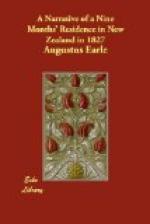This calamity had made us acquainted with another of their barbarous customs, which is, whenever a misfortune happens to a community, or an individual, every person, even the friends of his own tribe, fall upon and strip him of all he has remaining. As an unfortunate fish, when struck by a harpoon, is instantly surrounded and devoured by his companions, so in New Zealand, when a chief is killed, his former friends plunder his widow and children; and they, in revenge, ill-use and even murder their slaves—thus one misfortune gives birth to various cruelties. During the fire, our allies proved themselves the most adroit and active thieves imaginable, though previously to that event we had never lost an article, although everything we possessed was open to them.
When we questioned them about our property, they frankly told us where it was; and, after some difficulty in settling the amount of its ransom, we got most of our things back again, with the exception of such as had been carried off by the Ngapuhis.
Upon the cruelty of this custom I shall make no comments. Probably I should have remained in ignorance of this savage law, had I not had the misfortune to become its victim.
By redeeming from the natives what they had purloined from the fire, we had restored to us some of our boxes, desks, and clothes; but all our little comforts towards housekeeping were irretrievably lost. When the fire was over we received a visit from one of the missionaries, who made us a cold offer of assistance. We accepted a little tea, sugar and some few articles of crockery from them; but, although they knew we stood there houseless, amongst a horde of savages, they never offered us the shelter of their roofs. I am very sure that had the calamity befallen them, we should immediately have offered our huts, and shared with them everything we possessed. Here was an opportunity of practically showing the “pagans” (as they termed the New Zealanders) the great Christian doctrine of “doing to others as we would they should do unto us.” I must acknowledge I was sometimes mortified at being obliged to sleep (three of us huddled up close together) in a small New Zealand hut, filled with filth and vermin of all kinds, while at only two miles’ distance from us stood a neat village, abounding in every comfort that a bountiful British public could provide; and we, members of that community, and, indeed, partly contributors to the funds for its support.




